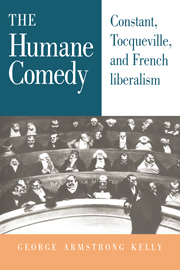4 - PHILOSOPHY AS CIVIL RELIGION
Published online by Cambridge University Press: 31 March 2010
Summary
HOW DOGMAS BEGIN! JOUFFROY, COUSIN, DAMIRON
In 1824, the eclectic philosopher Théodore Jouffroy published his memorable essay on the anatomy and pathology of dogmatism (“Comment les dogmes finissent”). First, Jouffroy argues, dogmas take shape because they are believed true for plausible and, within the age's mandated intelligence, verifiable reason. Later, the foundations of convictiqn change: faith cedes to authority, and is transformed into habit. The dogma rules only in appearance, however, for no one can exactly say why it should be observed. At this point, a spirit of critical inquiry arises. It is not at first hostile to the dogma, but merely searches for some living spark of justification in it. When it finds only corruptions of the truth, indolence of regard, and the play of ignorance and interest, it loses respect for the dogma, judging it worthy of contempt. A new faith will now be preparing to rise on the ruins of the old one, “lively because it is the awakening of human intelligence after ages of slumber… lively, in fine, because it is felt that it contains the seeds of a revolution.”
“The people who slumbered in indifference” are thus alerted to doubt; but “while reason draws them away from the dogma, and the love of novelty inclines them to skepticism, a still stronger influence holds them back, the power of custom and veneration for the past.” Now, “the men who govern in the name of the ancient faith,” but have lost their zeal for it, threaten physical force and even capital punishment against the innovators.
- Type
- Chapter
- Information
- The Humane ComedyConstant, Tocqueville, and French Liberalism, pp. 134 - 180Publisher: Cambridge University PressPrint publication year: 1992



